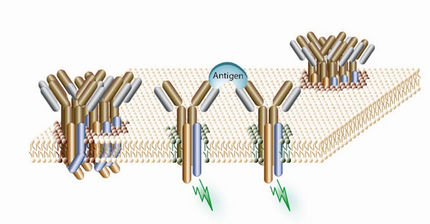Polyphenols and polyunsaturated fatty acids boost the birth of new neurons
Advertisement
Universitat Autònoma de Barcelona (UAB) researchers have confirmed that a diet rich in polyphenols and polyunsaturated fatty acids, patented as an LMN diet, helps boost the production of the brain's stem cells - neurogenesis - and strengthens their differentiation in different types of neuron cells. The research revealed that mice fed an LMN diet, when compared to those fed a control diet, have more cell proliferation in the two areas of the brain where neurogenesis is produced, the olfactory bulb and the hippocampus, both of which are greatly damaged in patients with Alzheimer's disease. These results give support to the hypothesis that a diet made up of foods rich in these antioxidant substances could delay the onset of this disease or even slow down its evolution.
The study will be published in the Journal of Alzheimer's Disease and was directed by Mercedes Unzeta, professor of the UAB Department of Biochemistry and Molecular Biology. Participating in the study were researchers from this department and from the departments of Cell Biology, Physiology and Immunology, and of Psychiatry and Legal Medicine, all of which are affiliated centres of the Institute of Neuroscience of Universitat Autònoma de Barcelona. The company La Morella Nuts from Reus and the ACE Foundation of the Catalan Institute of Applied Neurosciences also collaborated in the study.
Polyphenols can be found in tea, beer, grapes, wine, olive oil, cocoa, nuts and other fruits and vegetables. Polyunsaturated fatty acids can be found in blue fish and vegetables such as corn, soya beans, sunflowers and pumpkins. The LMN cream used in this study was composed of a mixture of natural products: dried fruits and nuts, coconut, vegetable oils rich in polyunsaturated fat and flour rich in soluble fiber. These creams were created and patented by the company La Morella Nuts, located in Reus near Tarragona. Previous studies had verified their effects on regulating cholesterol levels and hypertension, two risk factors commonly associated with heart disease and Alzheimer's disease.
The main objective of this research was to study the effect of an LMN cream-enriched diet on the neurogenesis of the brain of an adult mouse. Scientists used two groups of mice for the study. One group was given a normal diet and the other was given the same diet enriched with LMN cream. Both groups were fed during 40 days (approximately five years in humans). The analyses carried out in different brain regions demonstrated that those fed with LMN cream had a significantly higher amount of stem cells, as well as new differentiated cells, in the olfactory bulb and hippocampus.
The second objective was to verify if the LMN cream could prevent damage caused by oxidation or neural death in cell cultures. Cultures of the hippocampal and cortical cells were pretreated with LMN cream. After causing oxidative damage with hydrogen peroxide, which killed 40% of the cells, scientists observed that a pretreatment with LMN cream was capable of diminishing, and in some cases completely preventing, oxidative damage. The hippocampal and cortical cells were also damaged using amyloid beta (anomalous deposits of this protein are related to Alzheimer's disease). The results obtained were similar to those obtained using hydrogen peroxide.
These results demonstrate that an LMN diet is capable of inducing the generation of new cells in the adult brain, and of strengthening the neural networks which become affected with age and in neurogenerative processes such as Alzheimer's disease, as well as protecting neurons from oxidative and neural damage, two phenomena which occur at the origin of many diseases affecting the central nervous system.
In this study researchers have used different biochemical and molecular analysis techniques, with the help of specific antibodies, to detect different neuronal markers implied in the process of differentiation.
Other news from the department science
Most read news
More news from our other portals
See the theme worlds for related content
Topic world Antibodies
Antibodies are specialized molecules of our immune system that can specifically recognize and neutralize pathogens or foreign substances. Antibody research in biotech and pharma has recognized this natural defense potential and is working intensively to make it therapeutically useful. From monoclonal antibodies used against cancer or autoimmune diseases to antibody-drug conjugates that specifically transport drugs to disease cells - the possibilities are enormous

Topic world Antibodies
Antibodies are specialized molecules of our immune system that can specifically recognize and neutralize pathogens or foreign substances. Antibody research in biotech and pharma has recognized this natural defense potential and is working intensively to make it therapeutically useful. From monoclonal antibodies used against cancer or autoimmune diseases to antibody-drug conjugates that specifically transport drugs to disease cells - the possibilities are enormous






















































